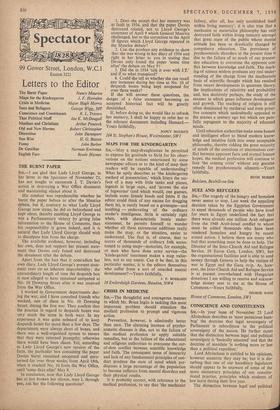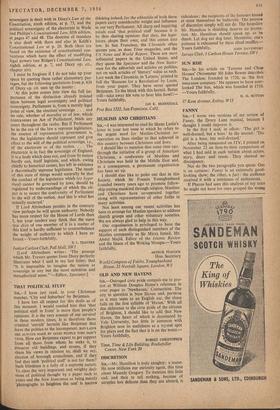CONSCIENCE AND CONSTITUENTS
SIR,—In your issue of November 23 Lord Altrincham describes as 'most pernicious hum- bug' the doctrine that legal sovereignty of Parliament is subordinate to the political sovereignty of the nation. He further states that the distinction between legal and political sovereignty is 'basically unsound' and that the doctrine of mandate 'is nothing more or less than a political expedient.'
Lord Altrincham is entitled to his opinions, however eccentric they may be; but it is dis- turbing that one of our hereditary legislators should appear to be unaware of some of the more elementary principles of our constitu- tional practice, principles which students of law learn during their first year.
The distinction between legal and political
sovereignty is dealt with in Dicey's Law of the Constitution, ninth edition, at p. 73, and the Political sovereignty of the electorate in Wade and Phillips's Constitutional Law, fifth edition, at pages 47 and 48. The doctrine of mandate Is also dealt with there and also in Keith's Constitutional Law at p. 20. Both ideas are based on the existence of constitutional con- ventions which have the effect of modifying legal powers (see Ridges's Constitutional Law, eighth edition, at p. 7, and Dicey op. cit., chapter xiv).
I must be forgiven if I do not take up your space by quoting these rather elementary pas- sages, but the following quotations from p. 430 of Dicey op. cit. sum up the matter :
'At this point comes into view the full im- portance of the distinction already insisted upon between legal sovereignty and political sovereignty. Parliament is, from a merely legal point of view, the absolute sovereign . . . and no rule, whether of morality or of law, which contravenes an Act of Parliament, binds any court throughout the realm. But if Parliament be in the eye of the law a supreme legislature, the essence of representative government is, that the legislature should represent and give effect to the will of the political sovereign, i.e., of the electorate or of the nation. . . . The electorate is in fact the sovereign of England. It is a body which does not, and from its nature hardly can, itself legislate, and which, owing chiefly to historical causes, has left in existence a theoretically supreme legislature. The result of this state of things would naturally be that the conduct of the legislature which (ex hypo- thesi) cannot be governed by laws, should be regulated by understandings of which the ob- ject is to secure the conformity of Parliament to the will of the nation. And this is what has actually occurred.'
If Lord Altrincham persists in the contrary view perhaps he will quote authority. Nobody has more respect for the House of Lords than but your readers may think that the mere ipso dixit of one member of it in a matter of this kind is hardly sufficient to counterbalance the weight of authority to which I have re- ferred.—Yours faithfully, [Lord Altrincham writes : 'The passage which Mr. Travers quotes from Dicey perfectly illustrates what I said in my last letter; that "It is impossible to imagine the nation as sovereign in any but the most nebulous and metaphorical sense." '—Editor, Spectator.]



































 Previous page
Previous page